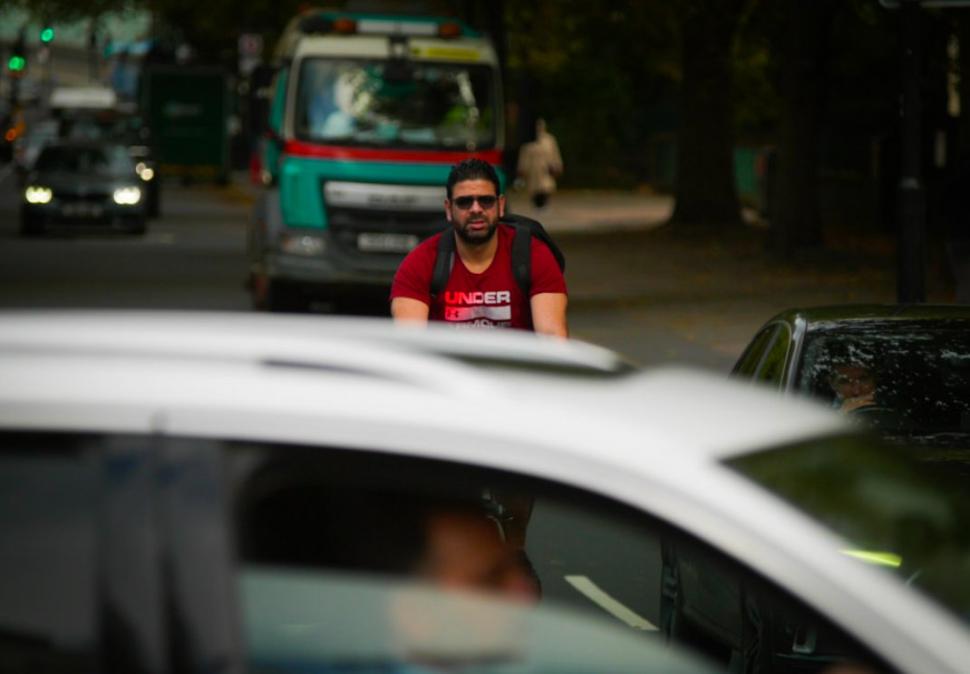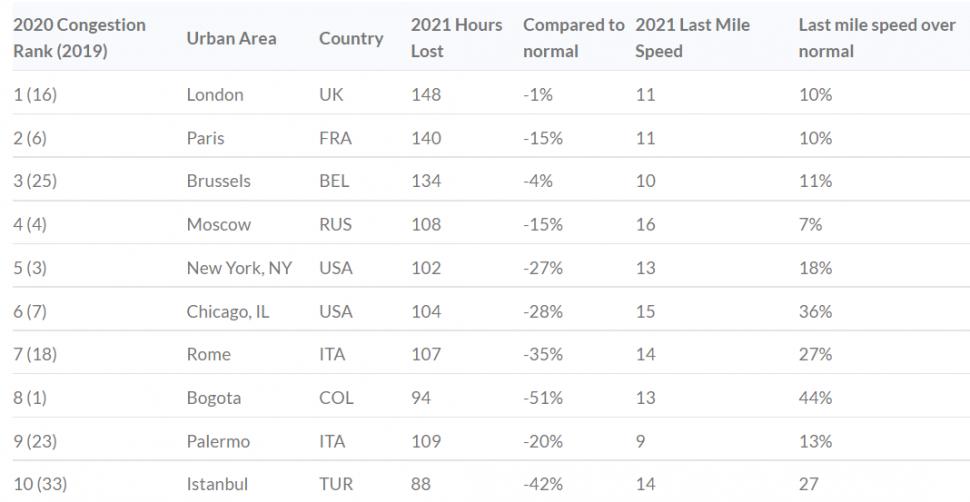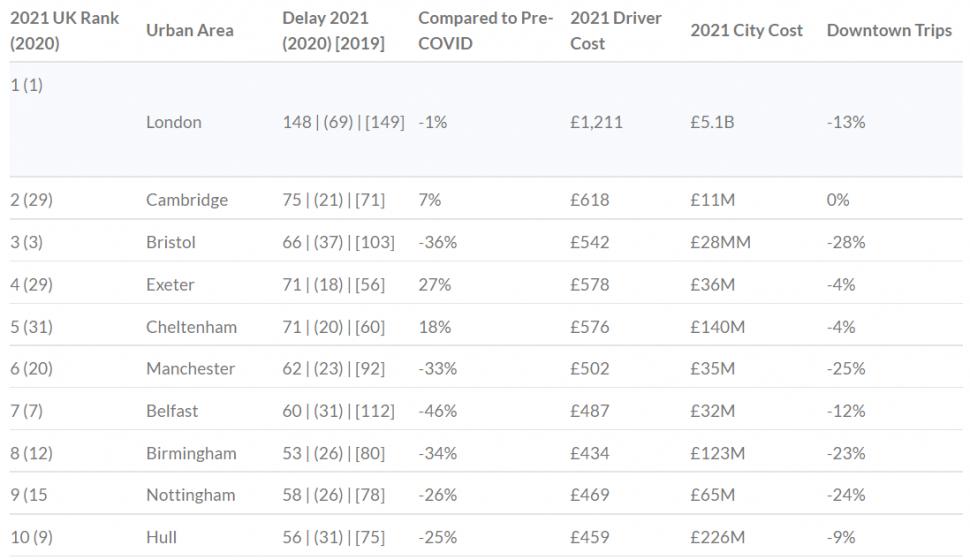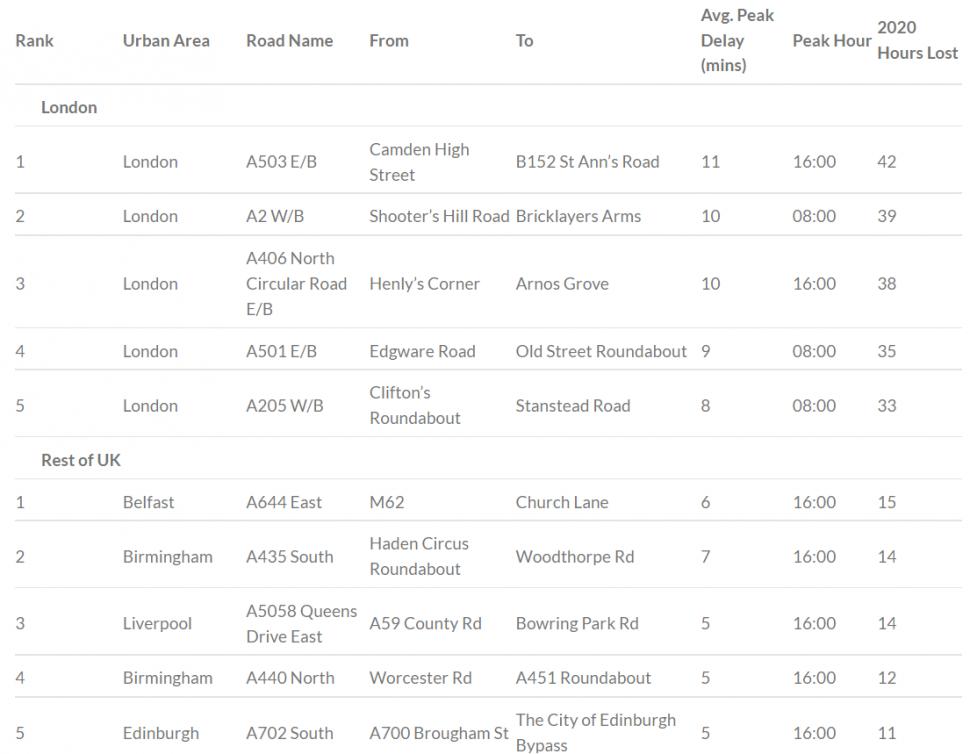- News
- Reviews
- Bikes
- Components
- Bar tape & grips
- Bottom brackets
- Brake & gear cables
- Brake & STI levers
- Brake pads & spares
- Brakes
- Cassettes & freewheels
- Chains
- Chainsets & chainrings
- Derailleurs - front
- Derailleurs - rear
- Forks
- Gear levers & shifters
- Groupsets
- Handlebars & extensions
- Headsets
- Hubs
- Inner tubes
- Pedals
- Quick releases & skewers
- Saddles
- Seatposts
- Stems
- Wheels
- Tyres
- Tubeless valves
- Accessories
- Accessories - misc
- Computer mounts
- Bags
- Bar ends
- Bike bags & cases
- Bottle cages
- Bottles
- Cameras
- Car racks
- Child seats
- Computers
- Glasses
- GPS units
- Helmets
- Lights - front
- Lights - rear
- Lights - sets
- Locks
- Mirrors
- Mudguards
- Racks
- Pumps & CO2 inflators
- Puncture kits
- Reflectives
- Smart watches
- Stands and racks
- Trailers
- Clothing
- Health, fitness and nutrition
- Tools and workshop
- Miscellaneous
- Buyers Guides
- Features
- Forum
- Recommends
- Podcast
news
 Cyclist in traffic (copyright Simon MacMichael)
Cyclist in traffic (copyright Simon MacMichael)“Incredibly simplistic” to blame cycle lanes for London being named world’s most congested city
London has today been named the world’s most congested city and, according to much of the media, cycle lanes are to blame – something the charity Cycling UK describes as an “incredibly simplistic” conclusion.
The 2021 Global Traffic Scorecard from traffic data specialists Inrix sees London jump from sixth to first place as the city in which motorists lost the most time stuck in traffic jams last year, replacing Colombia’s capital, Bogota, in the top spot.
Drivers in London lost 148 hours in traffic jams last year, down just 1 per cent from pre-COVID levels. In second place was Paris – a city where authorities have been far more proactive in putting emergency bike lanes in place and restricting motor traffic than the British capital has – on 140 hours, a 25 hour improvement. And in both cases, average last-mile motor vehicle speed actually improved by 10 per cent.
Here are the global top 10 most congested cities in 2020, according to the Inrix Global Traffic Scorecard.
A number of news outlets in the UK have seized upon a comment by Inrix operations director Peter Lees that cycle lanes installed in response to the COVID-19 crisis have brought about a “negative impact on congestion”.
He said: “Use of roads is all about supply and demand. If the demand goes up but the road space is being shared with other forms of transport, there’s less tarmac effectively for the cars to be on, which then has an impact on the speeds on the road and therefore congestion.”
The London Evening Standard covered the survey under the headline Cycle lanes blamed as London becomes world’s most congested city, while BBC News went with London congestion: Cycle lanes blamed as city named most congested. A number of other outlets have run with similar headlines.
However, Lees himself said that the principal reason for London taking the top spot was simply that it had recovered from the pandemic more quickly than other cities around the world (although that ignores other factors such as decreased use of public transport with many switching to cars, and a boom in van deliveries).
“One might argue it’s a good thing that the congestion is there because it’s showing that the economic recovery has been particularly quick, but the downside to that means congestion has returned,” he explained.
In fact, of the five most congested traffic corridors named in the capital by the Inrix survey, only one has seen any significant cycling infrastructure put in during the pandemic – the A501 eastbound from Edgware Road to Old Street Roundabout, and even then, only for the Euston Road section of the route.
That infrastructure was put in place under Mayor Sadiq Khan’s Streetspace for London programme, with the other high-profile temporary cycle lane in the centre of the capital, on Park Lane, not making the top five – nor indeed did Chiswick High Road, home to Cycleway 9 opened in December last year and which has faced bitter opposition from a vocal minority.
That mirrors road.cc analysis of findings in previous Inrix reports – pre-pandemic, for example, no road on which major cycling infrastructure had been built featured among the most congested in London in 2018.
And a report published earlier this year by Imperial College London found that “special London cycle lanes, which aim to boost commuting by bicycle, do not negatively impact traffic speed.”
Indeed, researchers found that while Cycle Superhighways “somewhat reduced traffic flow – the number of vehicles passing by in a certain time frame – they improved traffic speed, meaning overall there was little impact on congestion.”
Lead author of the study Dr Prajamitra Bhuyan of the Department of Mathematics at Imperial, said: “Estimating the effect of the cycle superhighways on congestion has been difficult, as there are many factors at play and the highways themselves were not planned randomly – they have been placed in areas plagued with congestion.
“Our method provides evidence that Cycle Superhighways can be an effective intervention in metropolitan cities like London, which are heavily affected by congestion. We hope the method can also assist in effective decision making to improve the performance of the traffic and cycling network in cities.”
Here’s what London Walking & Cycling Commissioner Will Norman had to say about the report published today.
Let’s be absolutely clear – decades of credible research shows that cycling & public transport are key to reducing traffic & pollution in cities. That’s why we’re continuing to invest in a high quality cycle network, enabling millions of green & clean journeys around the capital.
— Will Norman (@willnorman) December 7, 2021
Duncan Dollimore of the charity Cycling UK said: “It’s incredibly simplistic for Inrix to suggest that the use of road is all about supply and demand, without considering how efficiently that road space is used.
“On Blackfriars Bridge, cycle lanes take up 20 per cent of the road space but move 70 per cent of the people across it at peak times, with cycle lanes across London moving more people more efficiently in less space.”
Data from DfT shows that people on bikes outnumbered car drivers on Blackfriars Bridge (Central London) last year.
In 2000 the average daily flow was 50,000 cars and 1,125 bikes. In 2020 it was 8900 bikes, and 8800 cars and taxis.
A protected cycleway was installed in 2016. pic.twitter.com/yO3PDCaRGH
— APPGCW (@allpartycycling) December 3, 2021
He continued: “Inrix are focused on the tarmac available for cars, when the question should be how we use and allocate that space better, changing travel behaviours and reducing congestion in the process.
“Car dependency locks in congestion,” he added. “By building more cycle lanes, London is rebalancing their roads, offering a safe, healthy and space efficient alternative.”
Here are the top 10 most congested towns and cities in the UK 2020, according to the Inrix Global Traffic Scorecard.
And here are the most congested road traffic corridors in London and in the rest of the UK.
Latest Comments
- Rendel Harris 21 min 17 sec ago
Simple question, the coroner states that the driver was driving in accordance with the Highway Code. The Highway Code states that you are not to...
- hawkinspeter 1 hour 8 min ago
PKD foresaw it, though his novel was based on a different outcome of WWII, not the precursor to WWIII. Maybe the Idiocracy film is a closer fit?
- Hirsute 1 hour 12 min ago
I would have had someone standing outside with a big placard with...
- Hirsute 1 hour 17 min ago
"We pay our road tax" ! Handy to know if I go there that there will be spaces in the car parks !
- Tom_77 1 hour 18 min ago
Olympic gold medallist would remove name from cycle path if quarry plans go ahead...
- SecretSam 1 hour 42 min ago
The LEDs always were rubbish, TBH (v1 Bolt user)
- OnYerBike 3 hours 10 min ago
@Sredlums: I'm not sure I follow your logic. If someone grabs your helmet twists it, then the reason it doesn't feel good is because the outer is...
- Rapha Nadal 3 hours 10 min ago
Coming to the mid-paced Saturday club ride soon.
- Secret_squirrel 4 hours 6 min ago
Interesting review. I have the Bont MTB+ and they are the most comfy cycling shoes I have ever worn. I use them with a Superfeet Green Insole...
- Miller 4 hours 12 min ago
I have a few thousand km on a bike with the Ltwoo group so I'll be interested to see that reviewed.



Add new comment
42 comments
"An increase in cycle lanes during the coronavirus pandemic contributed to London becoming the world's most congested city, new analysis shows." BBC news.
How refreshing to see that the BBC has dropped it's generations of anti-cycling rhetoric and is finally reporting the facts; definitely not making up more anti-cycling stuff out of thin air.
Seriously, when are the cycling organisations going to get together and bludgeon the BBC into being fair and unbiased, as guaranteed by their charter and their editorial guidelines?
From the New Statesman:
Carlton Reid is on the case, as always.
'Nuff said.
Agree with all this. Obviously without the cars there wouldn't be congestion - most of the traffic is motor vehicles both by number and area occupied. However on arguing the point: I don't think you can take it as a given that others will "see" this. An example was the excellent the Invisible Visible Man - a journalist and cyclist who eventually stopped doing much cycle-writing partly over angry debates on this particular issue with other cyclists.
In his case - agree or not - he was actually arguing from the data. However ther is a more widespread "blockage" / "knock on effect" idea out there too. There's the simpler expressions of this: "bikes go slower than cars so they hold people up" / "if there's one less lane then you can't shift half as many cars". But there's a more considered point which runs as follows. At certain times some of our roads will be operating at or near capacity over a large area. Cars don't flow as smoothly as water (e.g. you get waves as they start / stop) and some are constrained in their journey (e.g. either they have to go a certain way or are just reluctant to re-route - obviously sat navs complicate this too). So it doesn't take much delay / reduction in capacity to cause a significant effect. Because of the lack of spare capacity / lags in shifting cars into space this is then propagated through the system. So a relatively small local change to road capacity creates more widespread issues.
Ban cyclist for a week and see how more congested it is , I don't live in a city but cyclist are blamed for everything, none of us apparently own a car we are CYCLIST. All the laws we break is unbelievable compared to drivers , not one must have gone over the speed limit , driven after one two many , none use their mobiles. Good job we all jump red lights , imagin how congested it would be.AHHHHH MUPPETS.
Cyclists move faster than the cars through city's. Wake up haters , there are good drivers their are bad there are bad , there are good cyclist there are bad. I've gone over the limit in my car hold my hand up, I did 40 in a 30 on my bike trying to get the car of my wheel that couldn't over take because on on coming traffic. Bottom of the hill window down and he yells don't ever hold me up again 🤷♂️, I'll have been a pain in the arse cyclist for him , they see bike ,they don't check their speed , just must get past he's holding me up. All drivers should have to take a cycling test , let em see what it's like and learn how to drive behind on and how to over take. Saw a bus feet of the back of a small child , path was too narrow for her , but zero care for her. Ohh we also don't pay road tax 🤣🤣🤣..
Ban the bikes for a week......and then ban cars for a week and compare.
Tubes and busses would be overrun , 🤣🤷♂️🤷♂️🤷♂️
Surely if cycle lanes caused congestion then the most congested cities in the world would be Amsterdam and Copenhagen?
Ah but everyone knows that Amsterdam * is such a living hell for the motorist that no-one even tries. And in Copenhagen the roads are so narrow now there are cycle lanes again few motorists can bear it.
* Amsterdam is far from the best city for cycling in the Netherlands (according to the Dutch cyclists union). Utrecht, Groningen, Zwolle etc. normally top it. - I'm always wary of polls and especially the "best cycling cities in the world" kind a) because organisations tend to give top prize to their own city (hello Copenhagen) and b) because the critera used to judge are very variable and sometimes seem a bit wacky - like they were thought up by journalists / civic officials who didn't actually do much "casual cycling".
So the roads aren't congested because there are too many vehicles, it's because there aren't enough roads (to get congested)
We just don't have enough roads. Think of all that countryside and woodland just lying about, no use to anyone. tarmac it over..
They paved paradise, to put up a parking lot.
We don' t actually have enough roads, cycling paradises such as the Netherlands have a much higher density of trunk roads than the UK and drive more miles. It's about selecting the most appropriate mode for the job, cars don't make sense for surface street journies in dense city centres, bikes don't make sense for intra urban journies. The UKs relatively poor trunk road network is almost certainly one of the major causes of the UK productivity gap between the UK and the continent.
As a % the amount of land under roads is pretty small, it just seems bigger because we mostly view the country from a road! In ecology terms it's pretty much a wash between a road and intensive monoculture farming which makes up much of our countryside.
In terms of CO2 new cars will all be electric by 2030 and we will have to solve for net zero for bulk materials (concrete, steel etc,) anyway, you won't achieve nearly enough impact by reducing usage and if you solve for net zero there isn't much of reason to reduce usage. Thus the idea that building roads locks in climate impact is not really true. Unfortunately it's much easier to campaign against a road scheme than it is in favour of more research into electrolysis of iron.
I'm sure somebody will make some argument for replacing cars with trains or similar. We already use rail as much as we ever did, we just do a lot more journies in total facilitated by road transport (around about 7X rail), unless you want to rely on hyperloops we would need to expand the railway network my many multiples of its existing capacity, the same goes for any other mode.
If you go out to East Anglia, the connections are not so good and they could do with some decent upgrades to the road network.
Net zero will be harder to attain with the volume of cars - circa 38m I read yesterday - and expected to rise by 28% by 2050 (where will they be stored ?!)
Some queries with this one:
Why not? In that case we don't have enough anything, because we could have more and if we did some of the new stuff would probably get used - ergo we didn't have enough of it?
It's about choices / prioritising, no? We already know about induced demand.
I believe the Netherlands has more density of most things that go along with people, that being more ... dense. Do you mean a higher proportion of trunk roads relative to all roads? Or more trunk road miles per head of population?
I believe you're right about the Dutch travelling further on their commutes (2011) - not sure if this is all by car though. It might be.
Cars are often not optimal transport e.g. for short journies. Dense urban areas might work better if there were fewer cars (both parked and moving). Bikes can make perfect sense for intra-urban journies - it just depends on distance and on making the conditions attractive to do so. What we definitely *don't* have enough of in the UK is safe and convenient provision for making those bike journies.
No idea if that's the case or not - citation needed! The UK has certainly spend decades prioritising not just road transport but road freight over other options. Does everything involved with "productivity" need a road though? Given our economy is structured differently from many European countries I'm not sure it follows.
Hmm - so you've checked all that electricity then and none is coming from fossil fuel power? What about all the emissions involved (from the vehicles / processes / materials) as we create all our new "zero emissions" power generation? It might well be a good switch - but not zero!
It does seem to be a human cognitive feature that "out of sight = out of mind". Remember - for "zero emissions" read "emit elsewhere". (yeah - "generate elsewhere" but we don't have "net zero" generation). Lots of our "clean technologies" and things to do with "electric" or even future hydrogen fuelled things seem to blindside otherwise critical thinkers.
As for iron electrolysis - that may be all good but note that its production still wouldn't a zero emissions process.
Here you're (tangentially) on to something. Humanity has a long-running trend towards using more resources. That occurs even when we shift to a more efficient technology. (Nice bit about more cars through the decades using the same energy here). It's tricky to slow down the rate of increase - or even just plain travel less - but we do have a choice. It is possible to do a bit better than harm minimisation. People can cooperate so they avoid the tragedy of the commons / tearing through resources as fast as they can. Also the number of traffic isn't a given. There are examples of this in exactly the mode we're talking about - driving - see traffic evaporation.
https://blobby.wsimg.com/go/60c05181-e05a-4877-8212-f0729af8bbb8/Traffic%20Evaporation%20.pdf
https://thecityfix.com/blog/traffic-evaporation-what-really-happens-when-road-space-is-reallocated-from-cars/
It's all the cyclists fault. Pesky road lice, red lights, hi viz, 2 abreast, pavements, road tax, blah blah blah.
Surely this requires a holistic approach taking into account all modes of travel. This smacks of being private motor vehicle centric. A million people every day may have quick and efficient commutes by foot, bicycle, possibly even public transport but if 100,000 motorists get caught in a traffic jam of their own making, then it is a disaster.
Anybody know where London came in terms of cycling friendly cities? As long as it's somewhere near the top then I think that's a fair swap for the car congestion.
I'd agree that might be a good swap and I suspect that a decent modal shift away from car use decreases congestion in the medium - long term even if you do that via decreasing road capacity.
These kind of polls are often... questionable. For example Copenhagenise runs / ran one which surprisingly always found Copenhagen to be at the top - here's a couple of Dutch / Danish video comparisons here and here). But I doubt London's particularly high.
You can have places which aren't particularly "cycle friendly" but where there is still a fair bit of cycling (e.g. cars are not affordable / restricted for some reason, motor traffic speed is low or there's demand for short distance / cheap / easily storable transport). Detail's important - see Tokyo and Beijing for example.
Modal share alone - wikipedia has sortable data. It notes that putting all this together has some issues (e.g. comparability of sources, does this overlook some important differences etc.)
None Of Top Five Congested Roads In U.K. Feature Adjacent Cycleways (for any significant distance)
https://www.forbes.com/sites/carltonreid/2021/12/07/none-of-top-five-con...
I simply cannot believe that London is the world's most congested city. For years the world's most traffic congested cities have included Moscow, Sao Paulo, Istanbul, Mexico City, Beijing, Delhi, Bangkok, Mumbai, Cairo, Los Angeles and Lagos. That's a fact according to numerous traffic surveys.
Having been to Bangkok, Beijing, Cairo, Delhi, Istanbul, Lagos, Los Angeles and Mexico City, I've seen how horrendous they all are at rush hour. I know Beijing the best of those cities and rush hour there can be unbelievably frustrating. I live in London and it's not in the same league. Sorry, but that survey is unbelievable.
Is it not the case that many of those other cities are more congested because they have wider roads with more lanes of motor traffic?
Almost all of those cities have wider roads with more traffic lanes than London. Beijing, which I know best of them, has multiple traffic lanes on its major routes. It does have a pretty good underground system, but it's incredibly busy at rush hour, far more so than the Tube in London. But Beijing has more than twice the population of London. Mexico City has a population estimated officially at about 21 million, but as so many people live in illegal barrios, it could easily be around 24 million or three times that of London in other words. And bear in mind that Mexico City's public transport system is pretty basic, so the roads are jammed.
I remeber stood on my balcony at our hotel in cairo at midnight. The traffic outside the Museum of Antiquities was the worst I have ever seen. It was mayhem, not helped by most drivers driving with no lights on as it was considered rude to blind other roads users!
Spent 6 weeks in Cairo a lot of years ago and the 6th October Bridge was terrifying to say the least. Even regular roads were interesting as it was a case of lean on your horn and accelerate for the space. And if you weren't driving at speed it was a gradual crawl and slowly edging your way in to where you wanted. There was one night I vividly remember the guy driving muttered that we were in trouble. It turned out his horn had just packed in and we had now gone dark.
Incredibly simplistic?? plain facking wrong more like...
agreed Id have certainly used much harser language of the one syllable variety, such that it could be easily digested and quoted by the tabloids promoting this myth and their readers might even understand it.
Anyone care to share a link to an actual copy of the report? Requested one from their site but either they havent sent it or my company spam filter ate it.
Loving these cost claims.
Someone gets home and misses the start of emmerdale and that's a financial cost ?
Rather than some nominal cost, how about a marginal cost instead?
Well it is to ITV - fewer eyeballs - less ad revenue.
itv hub
Pages